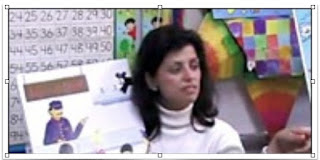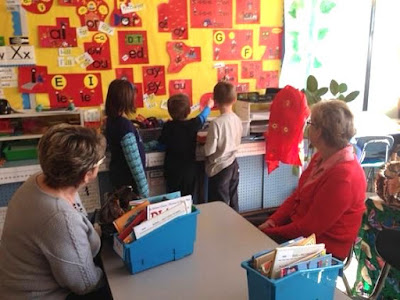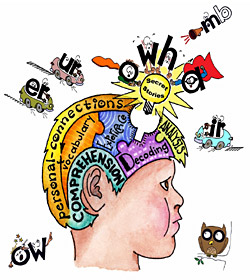 |
|
|
As September draws to a close, that initial excitement over “going back to school” begins to wear off.
This is my younger daughter, Emma (when in first grade) doing her best to stand up to my “teacher-mommy” grilling about her red behavior note, sent home at around this same time of year. It was so hard to keep a straight face! I gave her a big hug at the end (although it’s cut off) for finally coming clean about what had really happened, and I’m happy to say that she never again hid a behavior note! (though it would be several more weeks before she finally stopped earning them! :)
Aside from showing that it’s harder to justify your behavior note when your mom is a teacher, this video also demonstrates the importance of trust between teacher and parent, specifically in regard to the feedback provided regarding concerns about their child’s progress in the classroom.
It always seems that it’s around this time that the honeymoon-stage comes to an end, prompting bubbles to burst, and tempers to flare.
This is why it’s so very important that we continue to reinforce to our parents (especially at the early grades) that we truly are all in this together and that either everybody wins or everybody loses.
Even the most experienced teachers can feel frustrated when the “thoughtfully written, time-consuming, and well-intentioned” note sent home, detailing a student’s behavior or academic progress, is met with an accusatory response or angry rebuttal.
Parents don’t always realize that it takes a tremendous amount of time for teachers to provide them with detailed, written accounts of situations regarding their child, (like the one received from my daughter’s teacher, above) especially on an ongoing basis, but as teachers, we know that these communications are critical to student success.
Even our most well-intentioned correspondence, however, is likely to be met with animosity until trust has been established.
So here are just a couple of simple tips that I’ve found work wonders to build and maintain parent-trust!
Give parents your personal phone number!
While this may seem counter-intuitive, it’s actually a powerful show of trust, and one that parents who haven’t yet gotten to know you (especially at the earliest grade levels) truly appreciate.
And don’t worry…..most of your parents won’t even use it! Knowing that they have it is enough.
For those parents who do call, they are the ones who would have otherwise “stewed all day and night” over something that is easily clarified or handled! Their being able to call you immediately means that you (or your administrator!) will not be dealing with a gigantic mess the following school day!
Implement an “open-door” policy when it comes to your parent volunteers in your classroom!
Most classroom teachers have designated days and times each week during which parents may sign-up in advance to come and volunteer in their classroom.
My policy was a little simpler… “Anyone, anytime, any day!”
While this may sound like a nightmare waiting to happen, it’s actually just the opposite!
The natural concern is that when given the option, the most difficult parents may never leave!
Surprisingly, those are the parents that rarely, if ever, actually come!
Presumably, because they can, which means that there are no “hidden secrets” for them to find out.
And those who do come, even for just for a few minutes here or there, can actually play a huge role in increasing student-momentum in both reading and writing!
My parents knew they were welcome in our classroom any time to volunteer, which most often involved their working with individual students or small groups on instructional-level text.
My volunteer corner was set up as an extension of our guided reading groups, with each student’s group reading material contained in a folder with their name, and marked by color to indicate the “like-level” student groupings. As student reading levels continued to advance at varying rates, the groups were flexible and constantly changing.
Volunteers were able to walk in and without direction, pull either single students or groups (depending on who was available and what our class was doing at the time) with which to work. It was easy to keep track of “with whom and when” each student had last worked with a simple sign-in/ tracking-sheet that volunteers would fill-out each time they came.
Using parent volunteers as an extension of daily guided group reading ensured that student folders were always ready to go and up-to-date, with each student’s most current level reading material already in place!
And speaking of “increasing student-momentum in reading and writing” …
In my last post, I shared some video clips of a first-grade class who’d just begun using the Secrets, and doing their best impressions of the Superhero Vowels® & Mommy e®, so to wrap up today’s post, I want to share this clip of the same group of first graders, who have now progressed to identifying the Secrets!
 |
|
The SECRET STORIES® Musical Brainteasers are designed to mimic the decoding and encoding processes, as students must rapidly sing from ‘sound to symbol’ and ‘symbol to sound” via a variety of progressively difficult and constantly-changing song manipulations.
|
 |
| ….and here’s a group of Kinder-Intervention students singing the ‘short & lazy’ vowel sounds! CLICK HERE TO WATCH |
 |
Never Miss a Secret! Subscribe to the Newsletter! |
Secret Stories® Makes Phonics Make SENSE!
 |
|||
|















